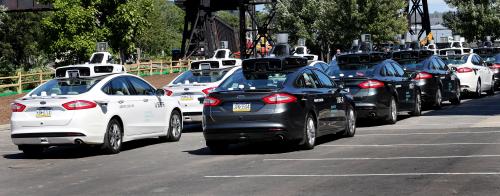Since it is time for summer reading, here are the three books I have been reading. They are all about how the world of tomorrow might look like, trying to make sense of digital transformation from different angles:
First, there is the seminal book by Klaus Schwab, CEO of the World Economic Forum, on the “Fourth Industrial Revolution.” The first surprise was that the book was only published about a year ago, even though it feels that the concept has been around for very long. Schwab’s book is a plain presentation of key trends, tipping points, and impacts of the fourth industrial revolution. He also argues that the Fourth Industrial Revolution and big data, and not only quantitatively, is different from Third Industrial Revolution. In fact, it presents a qualitative quantum leap, linked to the horizontal integration of the digital space in all aspects of life. One of the best parts of the book is an annex presenting a survey of 800 leading experts, predicting major breakthroughs until 2025. For example, 78 percent believe that there will be more than 10 percent of driverless cars on United States roads in less than eight years from now.
To get a preview, here is a blog summarizing the book, and don’t miss this wonderfully uplifting 11-minute video.
Second is Big Data in Practice: How 45 Successful Companies Used Big Data Analytics to Deliver Extraordinary Results from big data evangelist Bernhard Marr. He presents 45 big data success stories in a very systematic way, covering the ususal suspects (e.g., Google, Facebook, Amazon, IBM), the secretive Palantir, which works closely with the U.S. government in anti-terrorism, and businesses in traditional industries such as Walmart, Rolls-Royce, and Shell.
Marr also provides a succinct explanation of the technical breakthrough that made big data possible in the first place. In the past, more data meant a slowdown in processing times. Thanks to “distributed computing” huge amounts of data can now be stored and accessed:
Google was instrumental in developing distributed computing technology, enabling them to search the internet. Today, about 1000 computers are involved in answering a single search query, which takes no more than 0.2 seconds to complete.
Third is Seth Stephens-Davidowitz’s book, Everybody Lies: Big Data, New Data, and What the Internet Can Tell Us About Who We Really Are. This is the most engaging book, drawing actually from big data itself, mostly Google searches. Stephens-Davidowitz covers many subjects, including more sensitive ones like sex, racism, and abortions. He presents several n new numbers (e.g., the share of America’s gay population seems to be around 5 percent, instead of 2-3 percent) and more counterintuitive findings (violent movies lead to less violent crimes). While some of these findings can’t be fully explained, they shouldn’t be disregarded because “if your goal is to predict the future you do not need to worry why your model works. Just get the numbers right.”
Stephens-Davidowitz’s ends with a novel data analysis, calculating the share of readers finishing books, in which Thomas Piketty’s much discussed “Capital in the 21st Century” ranks near the bottom (3 percent finish the book). If you read this blog carefully and made it this far, you might also find out which book I have already finished and which ones I am still working on.
Happy summer reading!







Commentary
Future Development Reads: Books on digital transformation for your summer reading list
July 14, 2017